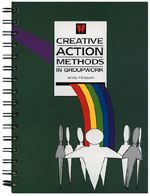 by Andy Hickson, Actor, Playwright and Group Leader
by Andy Hickson, Actor, Playwright and Group Leader
Highly practical and accessible, this unique manual outlines "action method techniques" for exploring difficulties or problems, and by using the safety of a group, discovers ways of overcoming them.
Full Description:
Highly practical and accessible, this unique manual outlines "action methods techniques" for exploring difficulties or problems, and by using the safety of a group, discovers ways of overcoming them. This book is divided into three easy-to-use sections: Section one covers different approaches to action methods; Section two includes numerous carefully selected exercises and ideas that explore awareness, ability and the potential for change; Section three concludes with notes on evaluating your groupwork and includes sample evaluation sheets. Sample Activity Aims: Tackling group difficulties, creativity, imagining, sharing
Average length: 60 minutes
Materials and preparation: None
Action and procedure This exercise can be used at any time but is particularly useful when the group leader feels that the group itself is not working as well as it could. It is also a good way of seeing how each participant sees the group as a whole. Sometimes people may not want to participate in a group, may just want to prevaricate or just feel plain stubborn. It is at times like this that the group may not be able to build one image that everyone is happy with or that everyone has made a contribution to. The group leader should invite volunteers to build an image of the group, continually consulting the group on progress made, adding or taking away elements that are non-essential. Eventually an image is created and the group leader reminds everyone that they are part of the image. Even those people who refuse to participate are part of the overall image because they are taking roles of people who are refusing to participate. So within the room you will have one giant image with a nucleus of people on the inside and people on the outside who are refusing to participate or maybe are just 'happy watching'. Now tell those people who are happy with their positions in the nucleus to stay there and those that are unhappy about their positions in the nucleus to go and sit down. The group leader should also tell those that are not participating or are just watching that, if they feel uncomfortable with their positions, they may either join the nucleus or go and sit down. After all these movements have been made the group leader asks the participants to come out of the image and to go back in wherever they want (that is, not in a position that has been imposed on them). This final image harmoniously, what transormations may be needed to help and what hidden grievances people may be holding.
Closure
Talk to the group about these images. How did they make them feel? Are divisions too great?
197 pages; 8 X 9;soft bound
- Foreword
- Acknowledgements
- Introduction
- SECTION 1:
- Different Approaches to Action Methods
Drama games
Psychodrama
Dramatherapy
Theatre of the oppressed
Ritual- SECTION 2:
- Methods and Techniques (Action in Action)
Introducation
The body in action
The voice in action
The sense in action
Games in action
Images in action
Scenes in action
Follow-up action- Appendix
Associated Therapies
Evaluation
Bibliography
Alphabetical list of activities
In-Stock- Usually ships in 20-30 business days!
|